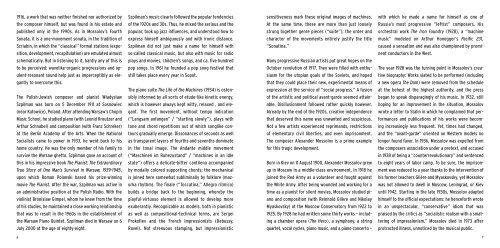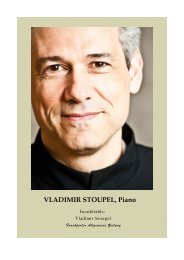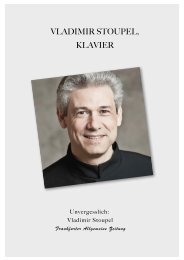the life of the machines - Vladimir Stoupel
the life of the machines - Vladimir Stoupel
the life of the machines - Vladimir Stoupel
Sie wollen auch ein ePaper? Erhöhen Sie die Reichweite Ihrer Titel.
YUMPU macht aus Druck-PDFs automatisch weboptimierte ePaper, die Google liebt.
1916, a work that was nei<strong>the</strong>r finished nor authorized by<br />
<strong>the</strong> composer himself, but was found in his estate and<br />
published only in <strong>the</strong> 1990s. As in Mossolov’s Fourth<br />
Sonata, it is a one-movement sonata, in <strong>the</strong> tradition <strong>of</strong><br />
Scriabin, in which <strong>the</strong> “classical” formal stations (exposition,<br />
development, recapitulation) are emulated almost<br />
schematically. But in listening to it, hardly any <strong>of</strong> this is<br />
to be perceived: wavelike-organic progressions and opulent-resonant<br />
sound help just as imperceptibly as elegantly<br />
to overcome this.<br />
The Polish-Jewish composer and pianist Władysław<br />
Szpilman was born on 5 December 1911 at Sosnowiec<br />
(near Katowice), Poland. After attending Warsaw’s Chopin<br />
Music School, he studied piano (with Leonid Kreutzer and<br />
Arthur Schnabel) and composition (with Franz Schreker)<br />
at <strong>the</strong> Berlin Academy <strong>of</strong> <strong>the</strong> Arts. When <strong>the</strong> National<br />
Socialists came to power in 1933, he went back to his<br />
home country. He was <strong>the</strong> only member <strong>of</strong> his family to<br />
survive <strong>the</strong> Warsaw ghetto. Szpilman gave an account <strong>of</strong><br />
this in his impressive book The Pianist: The Extraordinary<br />
True Story <strong>of</strong> One Man’s Survival in Warsaw, 1939-1945,<br />
upon which Roman Polanski based his prize-winning<br />
movie The Pianist. After <strong>the</strong> war, Szpilman was active in<br />
an administrative position at <strong>the</strong> Polish Radio. With <strong>the</strong><br />
violinist Bronislaw Gimpel, whom he knew from <strong>the</strong> time<br />
<strong>of</strong> his studies, he maintained a close working relationship<br />
that was to result in <strong>the</strong> 1960s in <strong>the</strong> establishment <strong>of</strong><br />
<strong>the</strong> Warsaw Piano Quintet. Szpilman died in Warsaw on 6<br />
July 2000 at <strong>the</strong> age <strong>of</strong> eighty-eight.<br />
Szpilman’s music clearly followed <strong>the</strong> popular tendencies<br />
<strong>of</strong> <strong>the</strong> 1920s and 30s. Thus, he mixed <strong>the</strong> serious and <strong>the</strong><br />
popular, took up jazz influences, and understood how to<br />
express himself ambiguously and with ironic distance.<br />
Szpilman did not just make a name for himself with<br />
so-called classical music, but also with music for radio<br />
plays and movies, children’s songs, and ca. five hundred<br />
pop songs. In 1961 he founded a pop song festival that<br />
still takes place every year in Sopot.<br />
The piano suite The Life <strong>of</strong> <strong>the</strong> Machines (1934) is ostensibly<br />
informed by all sorts <strong>of</strong> etude-like kinetic energy,<br />
which is however always kept witty, relaxed , and elegant.<br />
The first movement, without tempo indication<br />
(“Langsam anfangen” / “starting slowly”), plays with<br />
tone and chord repetitions out <strong>of</strong> which songlike contours<br />
gradually emerge. Dissonances <strong>of</strong> seconds as well<br />
as transparent layers <strong>of</strong> fourths and sevenths dominate<br />
in <strong>the</strong> tonal image. The Andante middle movement<br />
(“Maschinen im Ruhezustand” / “<strong>machines</strong> in an idle<br />
state”) <strong>of</strong>fers a delicate-bitter cantilena accompanied<br />
by modally colored supporting chords; <strong>the</strong> mechanical<br />
is joined here somewhat subliminally by folklore (mazurka<br />
rhythm). The finale (“Toccatina,” Allegro ritmico)<br />
builds a bridge back to <strong>the</strong> beginning, whereby <strong>the</strong><br />
playful-virtuoso element is allowed to develop more<br />
exuberantly. Recognizable as models, both in pianistic<br />
as well as compositional-technical terms, are Sergei<br />
Prok<strong>of</strong>iev and <strong>the</strong> French impressionists (Debussy,<br />
Ravel). Not strenuous stamping, but impressionistic<br />
sensitiveness mark <strong>the</strong>se original images <strong>of</strong> <strong>machines</strong>.<br />
At <strong>the</strong> same time, <strong>the</strong>se are more than just loosely<br />
strung toge<strong>the</strong>r genre pieces (“suite”); <strong>the</strong> order and<br />
character <strong>of</strong> <strong>the</strong> movements entirely justify <strong>the</strong> title<br />
“Sonatina.”<br />
Many progressive Russian artists put great hopes on <strong>the</strong><br />
October revolution <strong>of</strong> 1917. They were filled with enthusiasm<br />
for <strong>the</strong> utopian goals <strong>of</strong> <strong>the</strong> Soviets, and hoped<br />
that <strong>the</strong>y could place <strong>the</strong>ir new, experimental means <strong>of</strong><br />
expression at <strong>the</strong> service <strong>of</strong> “social progress.” A fusion<br />
<strong>of</strong> <strong>the</strong> artistic and political avant-garde seemed attainable.<br />
Disillusionment followed ra<strong>the</strong>r quickly however.<br />
Already by <strong>the</strong> end <strong>of</strong> <strong>the</strong> 1920s, creative independence<br />
that deserved this name was unwanted and suspicious.<br />
Not a few artists experienced reprimands, restrictions<br />
<strong>of</strong> elementary civil liberties, and even imprisonment.<br />
The composer Alexander Mossolov is a prime example<br />
for this tragic development.<br />
Born in Kiev on 11 August 1900, Alexander Mossolov grew<br />
up in Moscow in a middle-class environment. In 1918 he<br />
joined <strong>the</strong> Red Army as a volunteer and fought against<br />
<strong>the</strong> White Army. After being wounded and working for a<br />
time as a pianist for silent movies, Mossolov studied piano<br />
and composition (with Reinhold Glière and Nikolay<br />
Myaskovsky) at <strong>the</strong> Moscow Conservatory from 1922 to<br />
1925. By 1928 he had written some thirty works – including<br />
a chamber opera (The Hero), a symphony, a string<br />
quartet, vocal cycles, piano music, and a piano concerto –<br />
with which he made a name for himself as one <strong>of</strong><br />
Russia’s most progressive “leftist” composers. His<br />
orchestral work The Iron Foundry (1928), a “machine<br />
music” modeled on Arthur Honegger’s Pacific 231,<br />
caused a sensation and was also championed by prominent<br />
conductors in <strong>the</strong> West.<br />
The year 1928 was <strong>the</strong> turning point in Mossolov’s creative<br />
biography: Works slated to be performed (including<br />
a new opera The Dam) were removed from <strong>the</strong> schedule<br />
at <strong>the</strong> behest <strong>of</strong> <strong>the</strong> highest authority, and <strong>the</strong> press<br />
began to speak disparagingly <strong>of</strong> his music. In 1932, still<br />
hoping for an improvement in <strong>the</strong> situation, Mossolov<br />
wrote a letter to Stalin in which he complained that performances<br />
and publications <strong>of</strong> his works were becoming<br />
increasingly less frequent. Yet, times had changed,<br />
and <strong>the</strong> “avant-garde” oriented on Western models no<br />
longer found favor. In 1936, Mossolov was expelled from<br />
<strong>the</strong> composers association under a pretext, and accused<br />
in 1938 <strong>of</strong> being a “counterrevolutionary” and sentenced<br />
to eight years <strong>of</strong> labor camp. To be sure, <strong>the</strong> imprisonment<br />
was reduced to a year thanks to <strong>the</strong> intervention <strong>of</strong><br />
his former teachers Glière and Myaskovsky, yet Mossolov<br />
was not allowed to dwell in Moscow, Leningrad, or Kiev<br />
until 1942. Starting in <strong>the</strong> late 1930s, Mossolov adapted<br />
himself to <strong>the</strong> <strong>of</strong>ficial expectations: he henceforth wrote<br />
in an unspectacular, “conservative” idiom that was<br />
praised by <strong>the</strong> critics as “socialistic realism with a smattering<br />
<strong>of</strong> impressionism.” Mossolov died in 1973 after<br />
protracted illness, unnoticed by <strong>the</strong> musical public.<br />
6 7





